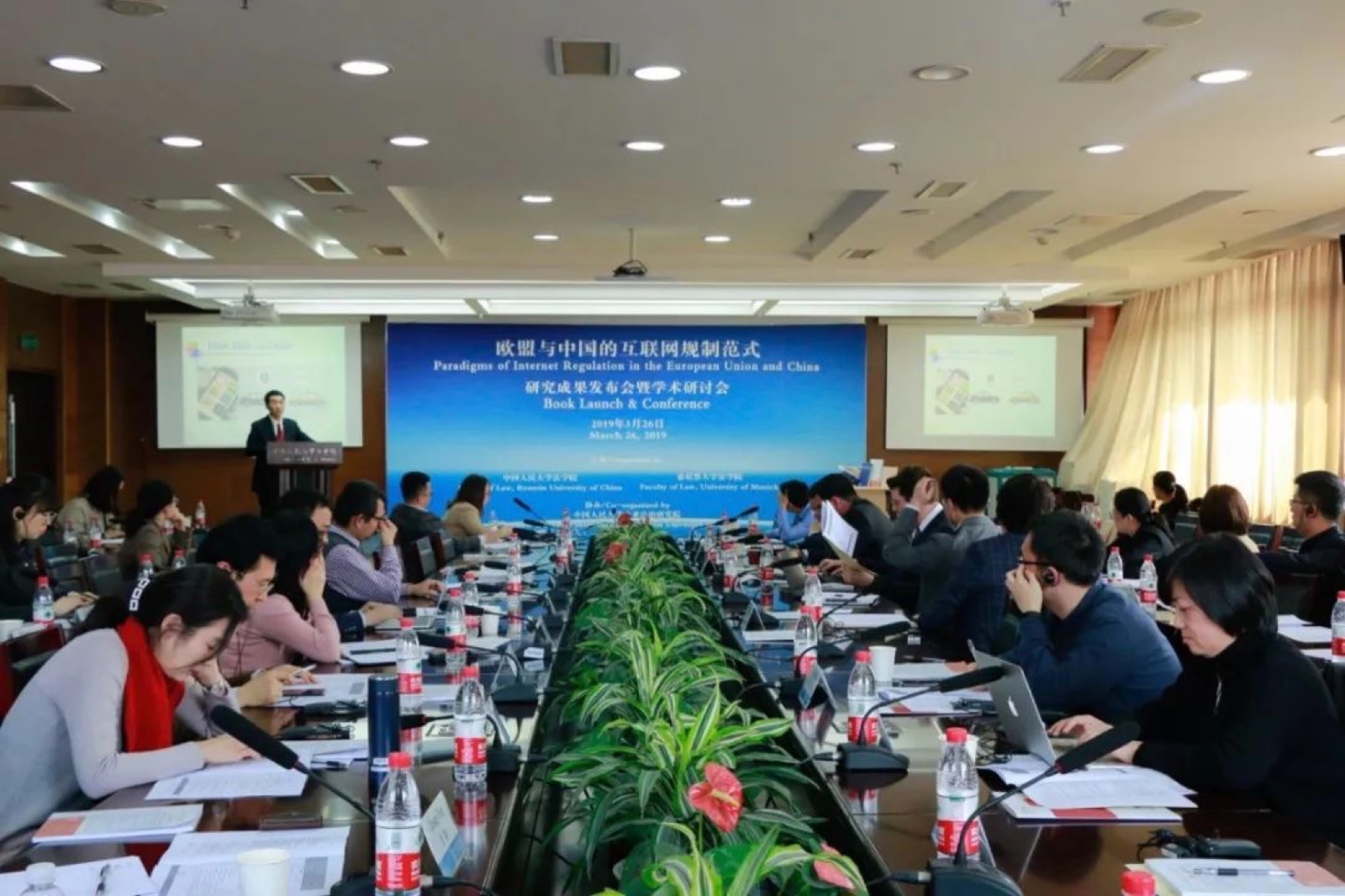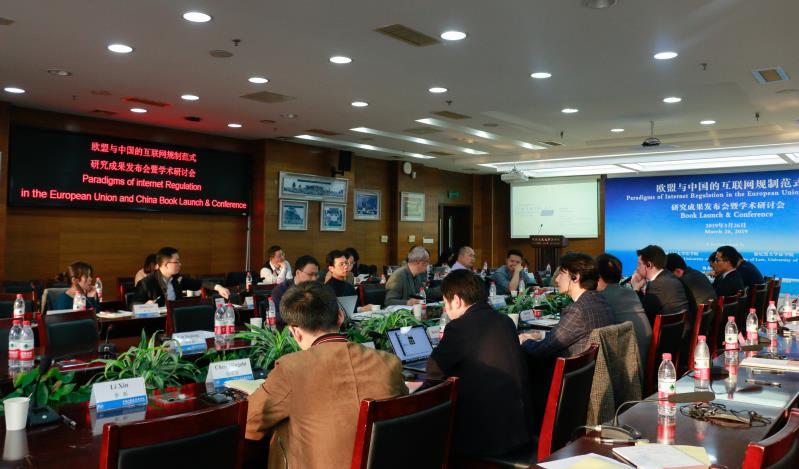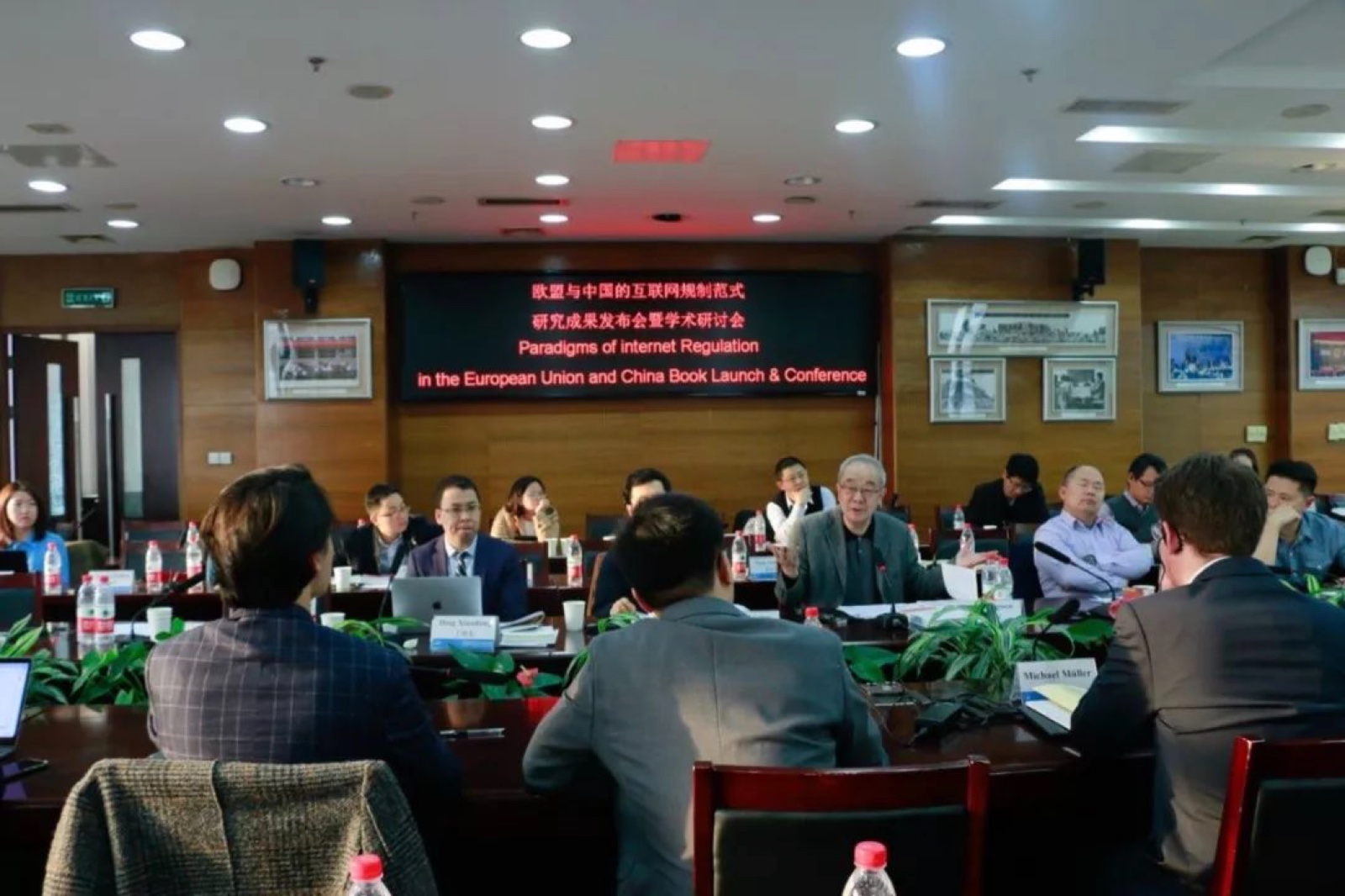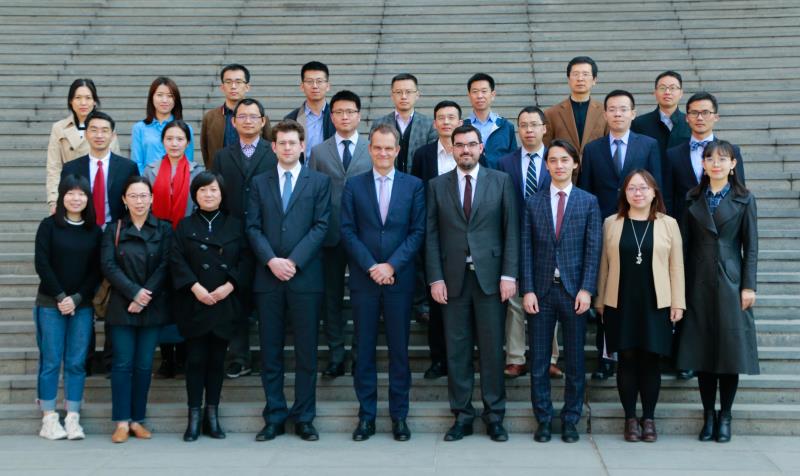Paradigms of Internet Regulation in the European Union and China Book Launch & Conference
time:2019-04-02Paradigms of Internet Regulation in the European Union and China
Book Launch & Conference
On the 26th of March 2019, a book launch and conference was convened to present the research outcome at Renmin Law School. They were run jointly by Renmin Law School and LMU Munich Faculty of Law, and co-organized by Law and Technology Institute of Renmin University. The participants included leading scholars in the field from several schools and institutes, such as Renmin University of China, LMU Munich, Max Planck Institute for Innovation and Competition, Chinese Academy of Social Sciences, Shanghai Academy of Social Sciences, Peking University and China University of Political Science and Law, as well as representatives from the regulators and internet companies. These distinguished guests all together witnessed the launch of the research outcome and participated in discussions on a wide range of related topics with particular emphasis on the following questions: propertization of personal data under the Internet sharing economy, regulation on non-professional taxis, Internet content regulation, liability of Internet intermediaries, criminal liability of network service providers, protection of personal data and the right to privacy, and regulation on cyber security.

The book launch marked the official start of the event. It began at 9 o’clock, moderated by Assoc. Prof. Dr. Zhang Jiyu, Executive Director of Law and Technology Institute of Renmin University, and Dr. Michael Müller from LMU Munich. In this session, Deputy Dean Cheng Lei, first of all, on behalf of Renmin Law School and Dean Wang Yi extended the warmest congratulation to the substantial result yielded from the joint research and expressed his appreciation for its remarkable academic value. Prof. Dr. Christian Walter, Representative for Academic Exchange at LMU Munich Faculty of Law, then delivered a speech where he gave greetings from Prof. Dr. Thomas Ackermann, Dean of LMU Munich Faculty of Law and highly praised the fruit of the research project by regarding it as a symbol of both academic cooperation and deep and abiding friendship between Renmin Law School and LMU Munich Faculty of Law.
After the opening remarks, Dr. Tian Wei and Dr. Walther Michl gave an introduction respectively on the whole process of the research and the research outcome on Internet regulation from German perspectives. Dr. Tian reviewed that the joint research was initiated at the end of 2016, with objectives to configure the law of the Internet and enhance the relationship between Renmin Law School and LMU Munich Faculty of Law. In the past two years, hard work and cooperation have contributed to the outstanding result, which successively went through two seminars and anonymous assessment by Nomos Press and Frontiers of Law in China Journal and was ultimately published in Germany and China in the December of 2018. He then on behalf of the research members (Yu Wenguang, Chen Xuan, Ding Xiaodong, Xiong Bingwan and Tian Wei) and his German colleagues (Christoph Krönke, Michael Müller, Laura Münkler, Walther Michl and Daniel Wolff) expressed the sincere appreciation to the two law schools in Germany and China, funders such as Scientific Research Office of Renmin University and LMU Munich Office of International Affairs, organizations such as Tencent Research Institute and the High Administrative Court of Bavaria where visits and researches are conducted, press such as Nomos and Frontiers of Law in China and individuals such as Prof. Wang Yi and Christian Walter, who wrote the foreword for the book, and Prof. Han Dayuan and Prof. Dieter Grimm, who wrote the introduction. As followed, Dr. Walther Michl briefly introduced the fruit of the joint research including one introduction and nine pieces of paper. The introduction offers a comprehensive overview of the paradigms of Internet regulation and pointed out the main content of each paper.
In the second session, the bookshop falls into four panels focusing on different topics: regulation on Internet-sharing economy, Internet content control and personal data protection, liability of Internet intermediaries, and cyber security regulation and electronic commerce law.

Prof. Dr. Wang Qinghua, Director of Center for Digital Economy and Legal Studies, Beijing Normal University Law School, presided in the first penal. In this part, Dr. Heiko Richter from Max Planck Institute for Innovation and Competition gave his insight into the propertization of data in the data-driven economy. He acknowledged whether data will be incorporated into property in law is in doubt but still encouraged regulations on data with emphasis on new paradigms and strategies. Assoc. Prof. Dr. Chen Lixing from Shanghai Academy of Social Sciences delivered a keynote speech on similarities and differences with China's standpoints and practices about digital trade provisions in US Free Trade Agreement. He pointed out the challenges posed upon the international trade pattern as well as responses of different countries and suggested a detailed and multidisciplinary analysis on this problem. Assis. Prof. Dr. Xiong Bingwan, Director of Research Center for Platform Regulation, Law and Technology Institute, Renmin University of China, focused on the allocation of regulatory power in the context of China’s sharing economy. He found the diversity of regulation among local governments and its inherent reasons and attached great importance to such investigation of regulation motives. This panel was concluded by the comments from Assoc. Prof. Dr. Zhao Peng, Vice Dean of School of Law-based Government, CUPL, Mrs. Xie Xiaoling, Deputy Director of Development Research Center at Research Institute of Highway, Ministry of Transport, and Mr. Zhao Teng, Dean of Policy Research Institute, Meituan Company. They admired the presented papers and advocated more research in the field.
In the second panel moderated by Prof. Dr. Zhi Zhenfeng from Chinese Academy of Social Science, speakers and panelists from Germany and China exchanged their viewpoints on Internet content control and personal data protection. Dr. Michael Müller from LMU Munich explored the way to identify Internet regulatory paradigms and, as an example, analyzed the history of European Internet content control. He also proved that Mapping Paradigms hold great methodological importance for future research of Internet regulation in comparative and historical perspectives. Assoc. Prof. Dr. Ding Xiaodong, Deputy Director of Law and Technology Institute, Renmin University of China, on the other hand, talked about personal data protection and algorithm regulation. Through discussions of issues and cases in the recent time, he argued that personal data protection was interwoven with issues like property, privacy and speech and especially analyzed the nature as well as regulation of user profile. As to comments, Prof. Dr. Li Xin, Director of Department of Law, Capital Normal University, and Mr. Chang Yujie, Director of Department of Law and Policy Research, Bytedance Company both regarded the two speeches praiseworthy and raised some thought-provoking questions for further investigation.
The third panel hosted by Mrs. Liu Yuqiong, Deputy editor-in-chief of Law Science Journal mainly discussed the liability of Internet intermediaries. At the beginning of this panel, Assoc. Prof. Dr. Chen Xuan from Renmin Law School and Law and Technology Institute, Renmin University of China, presented the boundary of criminal regulation in cyberspace. He opposed excessively general regulations on such criminal liabilities since criminal law imposes the sternest sanctions. Then he introduced prior relevant regulations and examined their justification under the theory of accessory and neutral behavior. Mr. Chen also shed lights on the preventing over-expansion of the crime scope. The other keynote speech of this panel was given by Mr. Cao Jianfeng, Senior Researcher from Tencent Research Institute. Mr. Cao focused on the Internet intermediaries’ liability in EU Copyright Law. With an overview of the right of communication to the public and the right of making available to the public, Mr. Cao made remarks about the test for the hyperlink infringement and related stipulations in the Directive on Copyright in the Digital Single Market Amendment (Draft). He argued that this amendment promoted the cooperation between intermediaries and copyright owners since it is aimed at narrowing the value gap in between caused by the Safe Harbor Rule. Besides, this amendment provided a special mechanism of liabilities for those platforms. He also found it rational to apply the Safe Harbor Rule in development of Internet in its infant phase and insisted on the regulation of intermediaries co-driven by law and technology in the following years.
This panel invited three panelists, Assoc. Prof. Dr. Wang Ying, Deputy director of Law and Technology Institute, Renmin University of China, Prof. Dr. Wan Yong, Director of Research Center for Technology Transfer and Investment, Law and Technology Institute, Renmin University of China, and Mrs. Li Li, Director of JD Legal Research Institute. They agreed with those speakers and additionally contributed to the discussion about some influential cases and theories aforementioned.
The last but not least part of the conference was on cyber security regulation and electronic commerce law. It was moderated by Assoc. Prof. Dr. Liu Yang from Renmin Law School and Law and Technology Institute, Renmin University of China. At first, Dr. Walther Michl introduced territorial approaches to Internet regulation. Dr. Michl therein explained that cross-border actions have substantially changed and challenged the international order. Such a boundless exchange of resources of all kinds brought bonus but also shifted the burden from countries to some giant companies. With this regard, an understanding of territory approaches mattered a lot to the Internet regulation. Dr. Hong Yanqing, Senior Fellow from Law and Development Academy of Peking University presented on the topic of understanding regulatory regimes of China for the cross-border data flow. He acknowledged that some opposed the cross-border data flow mainly for the risk in data security, privacy, justified public policy and national security. In this regard, most countries have reached a consensus about privacy protection. China, for example, via Cybersecurity Law implemented a higher standard of data protection regarding both individual and nation. In addition, Cybersecurity Law proposed an idea of “important data”, which is not well-defined and may be challenged but meaningful for the construction of the regulation framework.

In this part, Assis. Prof. Dr. Xu Ke, Executive Director of Digital Economy and Law Innovation Research Center, University of International Business and Economics, Mr. Fang Yu, Director of Internet Research Center, China Institute of Information and Communication, and Mr. Liu Jinrui, Associate Researcher from Institute of Law, China Law Society joined as panelists. They all called for attention on the cyber security with a wider perspective, encouraging worldwide cooperation and joint effort of the government, enterprises and individuals.
At 5 o’clock, a close remark was given by Prof. Dr. Zhu Jingwen, the Editor-in-Chief of Frontiers of Law in China. Prof. Zhu talked about the concerns arisen from the emerging technology such as the Internet. These concerns generally include old issues like privacy protection and risk distribution and also in part influence the way human beings live. Prof. Zhu also stated that being a prestigious law journal in English with the longest history in mainland China, Frontiers of Law in China facilitates academic exchanges by incorporating diverse perspectives to address the common concerns.
Finally, the moderator Assoc. Prof. Dr. Liu Yang made a short declaration, officially drawing to a close the whole conference.


